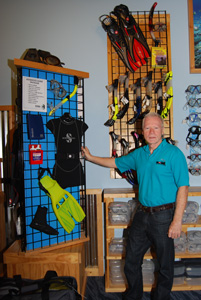Editorial
Front Page - Friday, November 27, 2009
Choo Choo Diving and Aquatic Center: Swim, learn, train, certify
Stephanie Coward

Steve Newman has logged more than 3,300 dives in his 39 years of diving. His wife Mary Ann has been diving for over 20 years. Together, the Newmans – co-majority shareholders of Choo Choo Diving and Aquatic Center – instruct and certify new divers while traveling the world’s most pristine dive sites.
“We’ve been literally across the globe, so we’ve got to see some of the most exciting sites and here locally in the U.S., I worked for five years in the summers on the USS Monitor Project, which is a Civil War Ironclad,” Newman said. The Civil War era wreck site rests about 240 feet below the Ocean’s surface off the North Carolina coast. “To be involved in getting back a piece of history is really nice.”
Water safety awareness for kids and parents is one of the center’s primary missions. Newman is working on a project with the Hamilton County Board of Education and the Sheriff’s Department about water safety programs for children in the first grade. According to Newman, drowning is the number one cause of accidental death, outside of car accidents, for children between ages 1 and 14. “Somebody needs to do something in every community to help prevent these accidents,” Newman said.
The dive center works with people of all ages. The target age to get children into a swim class is between 3 and 5, according to Newman.
The “Scuba Rangers” class is offered for children in the 7-12 age group. “The kids learn to do most everything an adult diver would do. It’s a combination of learn-to-dive skills but it’s more about aquatic education,” Newman said. Having instructor to student ratios of 1:2 allows the center to host trips for the children; the instructors also don’t dive deeper than 10-12 feet with the children.
A child can train to become a certified diver at 10. Once a person graduates the beginner level dive program, he is qualified to dive between zero and 60 feet with some going as deep as 100 feet with experience, Newman said. In the advanced open water program, a diver will learn underwater skills and activities such as photography, navigation, wreck diving or some other specialized form of diving. Upon completion of the advanced program, divers move beyond recreational range to technical diving, which is Newman’s specialty. He writes educational materials for Scuba Schools International and offers programs trains divers in deep extended technical diving.
“A typical recreation dive is no deeper than 130 feet, technical diving encompasses those depths beyond 130 feet and those dives that require stage decompression on the way back up,” Newman said. No decompression dives, which are also offered in the technical dive range, allow the diver to dive down and go back to the surface after a set amount of time. “Once you stay too deep, too long, you no longer have the option of coming back to the surface; you have to stop in steps we call ‘stages’ as you return to the surface.” These stages are necessary to allow the body to decompress, thus releasing the nitrogen that builds within the body to compensate for increased pressure during longer and deeper dives. However, the typical diver dives in a way to avoid compression entirely, according to Newman.
All of the basic training and swim lessons happen right in the 6,500 square foot center, which boasts a pool set at a warm 86 degrees and a pro shop that sells all diving equipment. Those wishing to become certified divers can complete all courses at the center or they can also become certified through the referral process. “Someone comes here and does the class and pool training and then we document that and send credentials so basically another instructor anywhere in the world and they complete their certification at a destination they’re already heading to” Newman said.
Divers also have the option to travel on one of the many trips the center sponsors annually. Newman just finished planning a trip for October 2010 to dive with great white sharks in the Guadeloupe Islands. “I never had a chance to do it before and I’ve been wanting to it all my diving career,” he said. “Finally going to go out and do it.”
The center also has a program for those who may be curious but hesitant about diving. When anyone comes in with lots of questions about diving, Newman encourages them to try scuba. “What we do is simply invite them into the pool and then as we do that, we explain the scuba equipment to them … and give them enough information so that they can get in the pool and actually experience it for themselves,” Newman said. “We’ll play a little checkers or maybe some underwater Frisbee while we’re in there.”
More information about the Choo Choo Diving and Aquatic Center can be found on the center’s Web site at www.choochoodive.com.
|
|